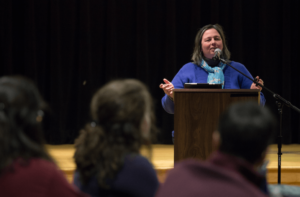by The Cowl Editor on February 15, 2018
Campus
by Alexandra Huzyk ’20
News Staff

In honor of Black History Month, and as a continuation of the conversation initiated by Dr. Bernice King’s Convocation speech, the first Theology on Tap of the semester was titled “Anti-Racism as a Necessary Christian Virtue.” The talk, led by Dr. Dana Dillon, a professor of theology at Providence College, delved into the pervasiveness of racism in America and the corresponding responsibility of Christians to establish anti-racism.
Dillon began the talk by sharing with the audience a personal story about how racism has affected her. When she was younger, she had been contemplating whether or not she and a friend should go take a trip to Canada. In her rationale, she used the argument: “Why not? We’re free, white, and 21.” The friend that she was speaking with, however, was half Chinese and half Hawaiian. She felt ashamed when she thought about the implications of what she had said, and this instance served as a moment of realization. Dillon said, “I had received a script from my parents, and others, that was implicitly racist.”
Dillon stressed, “Unless we are working to be anti-racist, we are passing on inherited habits of racism,” and we cannot be truly “good” Christians if we act in either intentionally or subliminally racist ways. In order to combat this mentality, she elaborated upon the Aristotelian premise that like acts can become like habits. If people can commit to a particular act, they can become oriented toward virtue through their actions. In other words, if a person makes the conscious decision of acting in anti-racist ways, they can then eventually live a life of anti-racism and lead others to that same way of life. “We are so used to seeing subtle forms of racism, implicit forms of white supremacy, as normal ways of being in the world,” Dillon said, “Our sense of what justice and love of neighbor looks like is terribly skewed.” Dillon asserts that every person must make a conscious effort to orient all of their actions around charity and love.
To expand on the context of racism in America, Dillon provided a brief history of racism and how that has influenced our current state. First and foremost, the establishment of the United States of America began with the killing and displacement of Native American people. Following this, slavery became a widely accepted practice and institution that persisted for over 200 years. Even with the legal abolition of slavery, racism remained a pervasive part of society, emblemized by a history of sharecropping, Jim Crow, and lynching. To emphasize the prevalence and widespread approval of racism, Dillon emphasized a quote from a Catholic bishop in Louisiana. This quote asserted that slavery was a necessary institution, “far from an evil,” because they were not capable of freedom. In a historical context, it was believed that it was the Christian responsibility to take care of people of color in order to lead them to a good life. Dillon emphasized that this mentality towards slavery was extremely un-Christian.
Dillon said, “Our Christian responses to racism, like our Christian responses to anything, need to be centered around Christ.” She said that Christ—as a person who was able to cross boundaries and borders, interact with the marginalized and be their advocate—should serve as an example for Christians today. This encompasses a tradition which Christians call the preferential option for the poor, a theological mentality that proposes giving love and help to those in need of it most. Within the context of racism, that means Christians have a responsibility to help those in need regardless of their race or ethnicity.
Dillon ended her talk with some steps towards confronting racism, in order to establish a life of anti-racism. Her first step was to recognize that race and racism concerns everyone. Dillon said, “It’s crucial for those of us who are Christians to not fall into the trap of white moderates who get along with the status quo and reinforce racial structures in our failures to act on them in concrete ways.” Her second step urged students to discuss racism with their friends, proposing the idea that friends hold each other accountable for using more appropriate and effective language.
Dillon also suggested that students take a Black or Latin American Studies class that would give them exposure to different authors of color and discussion with peers. Another step that Dillon proposed is for students to go to events on campus that are hosted by people of color as a powerful sign of solidarity. Lastly, Dillon emphasized her last step; “try to develop friendships and relationships across ethnic barriers.”
Following Dillon’s talk, Katherine Martinez ’20 said that most people are unwilling to hear about the issue of racism because they do not understand that it affects everyone regardless of race. She emphasized Dillon’s point that “one way to be an ally to people of color is to listen and learn.” In this way, one can truly hear a person’s story and determine how it intersects with one’s own life.